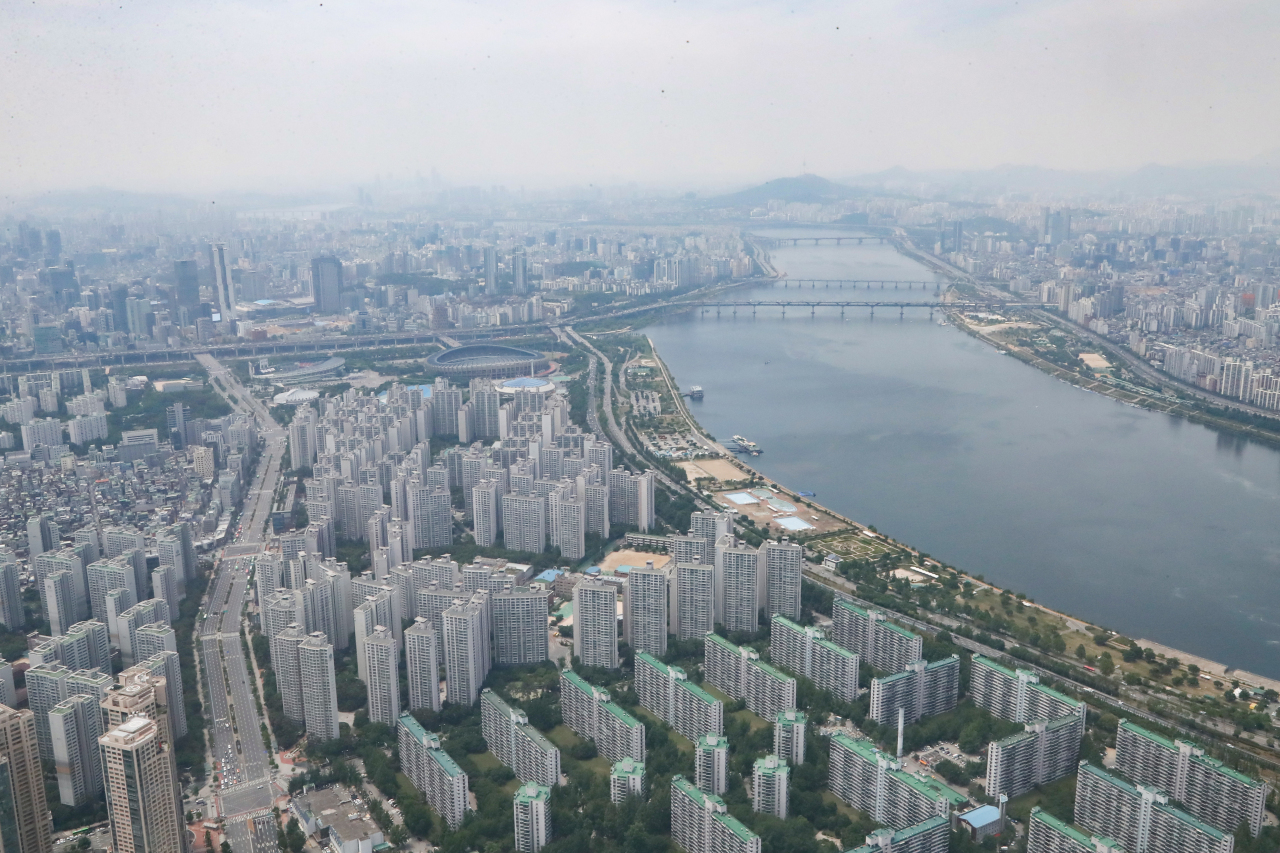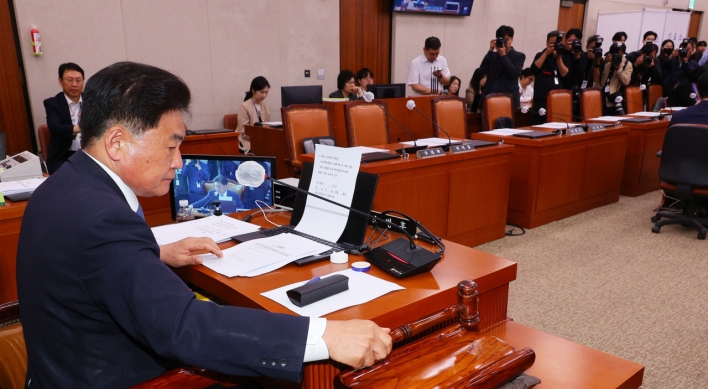After market backlash, authorities vow to soften blow on ordinary homebuyers
Criticism grows over new rules for depriving homebuying opportunities from non-speculative investors, ‘exception clauses’ in the works, officials say
By Bae HyunjungPublished : June 18, 2020 - 17:52

Perplexed by the market backlash against new reinforced housing loan regulations, South Korea’s government hurriedly added that it would soon introduce exception clauses for people buying homes to live in rather than for investment purposes.
The Ministry of Land, Infrastructure and Transport and the Financial Services Commission on Thursday issued a statement pushing back at local reports that accused the government of discriminating against non-homeowning citizens.
“(The government) has come up with the latest measures to deal with the increased trend of ‘gap investment’ and the escalating housing prices in the metropolitan and surrounding areas,” they said.
“Gap investments” have been blamed for aggravating the housing price bubble in the Seoul area by pushing speculative buyers to financial extremes on the back of low interest rates.
Korea’s unique jeonse system involves a lump-sum deposit instead of monthly rent, often equal to a substantial proportion of the house price.
In popular residential areas, investors can purchase homes by inserting a relatively small sum -- the “gap” between the down payment to be paid and the jeonse deposit to be received from the tenant. When the jeonse deposit comes due, the steady demand for jeonse homes means that if the tenant chooses not to stay, another tenant can easily be found who is willing to pay an equal or greater deposit.
Quoting the transaction data of Seoul’s key apartment complexes in the January-May period, the government said the increasing number of apartment purchases was mostly attributed to such speculative needs.
“The enhancement of the jeonse loan rules was to curb the increasing practice of ‘gap investment’ for mid-to-lower-priced houses,” the ministry and regulator said.
But recognizing the possibility of negative effects on ordinary homebuyers, the FSC added that it is currently working on clarifying and expanding exceptional clauses, hopefully by the time that the new loan rules take effect in July.
On Wednesday, the government rolled out stricter loan regulations to curb soaring house prices, marking the 21st comprehensive set of real estate-related policies under the incumbent Moon Jae-in administration.
Suburban cities including Incheon, Ansan, Osan and Pyeongtaek in Gyeonggi Province and key cities such as Daejeon and Cheongju, North Chungcheong Province, were added to the list of “modification target areas,” bringing the total to 69 from the previous 44.
In these areas, a loan-to-value ratio cap of 30 percent will be applied to apartments priced at 900 million won ($744,000) or more, while lower priced homes will face a 50 percent cap.
Suwon and Anyang, along with other areas in Gyeonggi Province, were added to the “overheated speculative zone” list, expanding the number of areas to 48 from the previous 31. Here, mortgages will be banned altogether for apartments priced at more than 1.5 billion won and the LTV ratio for homes costing more than 900 million won will be limited to 20 percent.
This is projected to slow down the momentum of the snowballing volume of outstanding jeonse loans, which stood at around 91 trillion won as of the end of May, in terms of the combined amount extended by five major banks here, including KB Kookmin, Shinhan and Woori. It had increased by 27.6 percent on-year and 69.5 percent compared to the same period in 2018, indicating its accelerating growth.
But the government’s latest set of rules -- mostly its ban on bank loans to “housing rental businesses” -- is likely to slow the growth. A slowdown had already started with waves of previous regulations, a report by Hana Financial Investment said.
“Jeonse loans, which accounted for most of the household loan growth, could have a major impact due to the new limits on the collateral and the government giving permission to banks to recollect jeonse loans immediately when the investor purchases an apartment over 300 million won,” Choi Jung-wook, an analyst at Hana Financial Investment, said in the report.
The new rules also work as obstacles for local lenders, as jeonse loans have worked as stable sources of profit compared to regular mortgages due to their shorter maturity and stronger guarantees.
“The new measures would work as caps for the banks’ household loan businesses as overall loan growth has been focused on corporate lending,” eBest Investment & Securities analyst Jun Bae-seung said.
By Bae Hyun-jung (tellme@heraldcorp.com) and Jung Min-kyung (mkjung@heraldcorp.com)
The Ministry of Land, Infrastructure and Transport and the Financial Services Commission on Thursday issued a statement pushing back at local reports that accused the government of discriminating against non-homeowning citizens.
“(The government) has come up with the latest measures to deal with the increased trend of ‘gap investment’ and the escalating housing prices in the metropolitan and surrounding areas,” they said.
“Gap investments” have been blamed for aggravating the housing price bubble in the Seoul area by pushing speculative buyers to financial extremes on the back of low interest rates.
Korea’s unique jeonse system involves a lump-sum deposit instead of monthly rent, often equal to a substantial proportion of the house price.
In popular residential areas, investors can purchase homes by inserting a relatively small sum -- the “gap” between the down payment to be paid and the jeonse deposit to be received from the tenant. When the jeonse deposit comes due, the steady demand for jeonse homes means that if the tenant chooses not to stay, another tenant can easily be found who is willing to pay an equal or greater deposit.
Quoting the transaction data of Seoul’s key apartment complexes in the January-May period, the government said the increasing number of apartment purchases was mostly attributed to such speculative needs.
“The enhancement of the jeonse loan rules was to curb the increasing practice of ‘gap investment’ for mid-to-lower-priced houses,” the ministry and regulator said.
But recognizing the possibility of negative effects on ordinary homebuyers, the FSC added that it is currently working on clarifying and expanding exceptional clauses, hopefully by the time that the new loan rules take effect in July.
On Wednesday, the government rolled out stricter loan regulations to curb soaring house prices, marking the 21st comprehensive set of real estate-related policies under the incumbent Moon Jae-in administration.
Suburban cities including Incheon, Ansan, Osan and Pyeongtaek in Gyeonggi Province and key cities such as Daejeon and Cheongju, North Chungcheong Province, were added to the list of “modification target areas,” bringing the total to 69 from the previous 44.
In these areas, a loan-to-value ratio cap of 30 percent will be applied to apartments priced at 900 million won ($744,000) or more, while lower priced homes will face a 50 percent cap.
Suwon and Anyang, along with other areas in Gyeonggi Province, were added to the “overheated speculative zone” list, expanding the number of areas to 48 from the previous 31. Here, mortgages will be banned altogether for apartments priced at more than 1.5 billion won and the LTV ratio for homes costing more than 900 million won will be limited to 20 percent.
This is projected to slow down the momentum of the snowballing volume of outstanding jeonse loans, which stood at around 91 trillion won as of the end of May, in terms of the combined amount extended by five major banks here, including KB Kookmin, Shinhan and Woori. It had increased by 27.6 percent on-year and 69.5 percent compared to the same period in 2018, indicating its accelerating growth.
But the government’s latest set of rules -- mostly its ban on bank loans to “housing rental businesses” -- is likely to slow the growth. A slowdown had already started with waves of previous regulations, a report by Hana Financial Investment said.
“Jeonse loans, which accounted for most of the household loan growth, could have a major impact due to the new limits on the collateral and the government giving permission to banks to recollect jeonse loans immediately when the investor purchases an apartment over 300 million won,” Choi Jung-wook, an analyst at Hana Financial Investment, said in the report.
The new rules also work as obstacles for local lenders, as jeonse loans have worked as stable sources of profit compared to regular mortgages due to their shorter maturity and stronger guarantees.
“The new measures would work as caps for the banks’ household loan businesses as overall loan growth has been focused on corporate lending,” eBest Investment & Securities analyst Jun Bae-seung said.
By Bae Hyun-jung (tellme@heraldcorp.com) and Jung Min-kyung (mkjung@heraldcorp.com)











![[Kim Seong-kon] Democracy and the future of South Korea](http://res.heraldm.com/phpwas/restmb_idxmake.php?idx=644&simg=/content/image/2024/04/16/20240416050802_0.jpg&u=)







![[Today’s K-pop] Zico drops snippet of collaboration with Jennie](http://res.heraldm.com/phpwas/restmb_idxmake.php?idx=642&simg=/content/image/2024/04/18/20240418050702_0.jpg&u=)